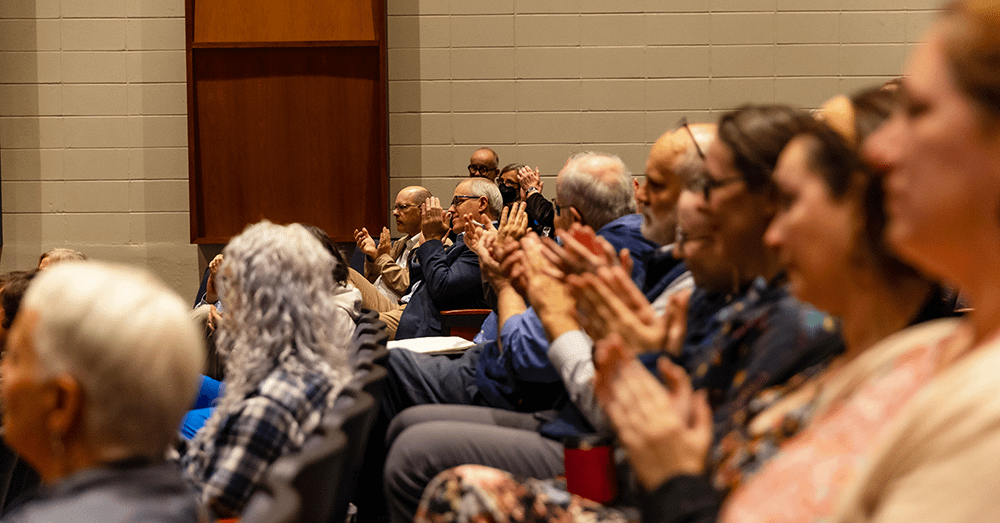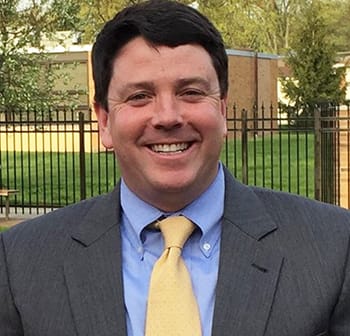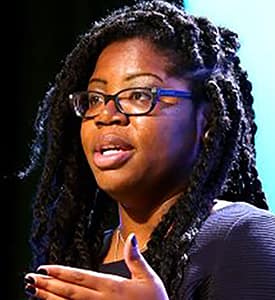Fifty years out: A timeless call to talk, heal, hear, respect
Fifty years ago this week in 1965, a Second Vatican Council declaration called Nostra Aetate (“In Our Time”) fundamentally changed how Catholicism, and by extension Catholic colleges like Saint Michael’s, interacted with and talked about other religions, particularly Judaism.
Fruits of the heightened sensitivity and openness invited by the Council’s outreach in Nostra Aetate – a short document by Vatican standards — are widespread and profound at Saint Michael’s, which has a long history of actively promoting interfaith study and dialogue, reflecting the welcoming spirit of the College’s founding Edmundite fathers. They are fruits present:
- In the College’s curriculum, including a rich offering of courses in Judaism, Islam, Buddhism and comparative religions, and the hiring of faculty with varied backgrounds to teach those courses and others.
- In several lecture series that arose after Vatican II focusing on inter-religious dialogue – most notably, an annual endowed speaker series named for the late Rabbi Max Wall, a generous, astute and respected longtime leader of the Burlington-area Jewish community. Rabbi Wall was, as usual, ahead of his time when he pro-actively built understanding out of misunderstanding, offering to teach courses on Judaism at Saint Michael’s even before Nostra Aetate in the wake of an unpleasant precipitating incident. Then-President Rev. Gerald Dupont SSE ’35 enthusiastically accepted his remarkable offer, and a long and rich relationship grew.
- In a feeling of collegial community across many faiths among faculty and students that now is part of the institutional fabric in a way that might scarcely have been imagined in the era before Vatican II — not because pre-Vatican II Saint Michael’s people were necessarily any less loving or welcoming in spirit, but simply because nearly all students and most professors were Catholics and the religion courses were primarily Catholic theology.
Says Joe Kroger, a Saint Michael’s religious studies professor and former Marian brother who has taught Buddhism and other Eastern religions since 1972, “the one sentence from Nostra Aetate that stood out for me said, essentially, ‘The Catholic Church rejects nothing which is true and holy in these religions’ — which says to me if I’m a Catholic, now I have a responsibility to find out about those things; the Church itself is now saying I need to understand them, so that leads to a lot of Catholic colleges and universities starting to study these religions.”
Such developments have been to the great enrichment of the College, believes Edward Mahoney ’65, a Saint Michael’s religious studies professor who recently organized a lecture series with three featured speakers to commemorate the Nostra Aetate anniversary:
On October 27, Donald Mitchell, an emeritus professor of philosophy, Asian Studies and Religious Studies at Purdue University, spoke on “Pope Francis’ New Dialogue of Fraternity as a Basis for Interreligious Social Action.” He said Pope Francis is calling on Catholics and all religions to a next step beyond simply a “dialogue of mutual understanding and respect” (the focus of Nostra Aetate) – a fresh step into a “dialogue of action” that meets the concrete needs of others in partnership with agents of active outreach from other faith communities. The speaker offered examples of early steps already at work in major American cities like Chicago and Los Angeles following a meeting with the pope this year by activists.
Next in the three-part lecture series will be Yahya Michot, professor of Islamic thought and Christian-Muslim Religions, Hartford Seminary. His topic at 4:30 in the Roy Room of Dion Family Center on Monday, November 2, will be “From dialogue to competition in good deeds: Nostra Aetate, Muslims and Justice.”
Then on December 3, Rabbi Noam Marans, the American Jewish Committee’s director of Interreligious and Intergroup Relations, will speak (same location and time) on “Celebrating 50 years of Transformed Catholic-Jewish Relations.”
Mahoney, Kroger and Edmundite Rev. Richard Berube, SSE ’66 (who was the first to teach about Islam at Saint Michael’s) all noted that Nostra Aetate chiefly and most urgently addressed the church’s relationship with the Jews on account of a centuries-long troubled history: namely, the Church persecuting Jews and cultivating negative attitudes toward them, from the creation of Jewish ghettos in Medieval times to the expelling of Jews from Spain, along with forced conversions and other expulsions — all entrenching animosities that came to a head in and directly after World War II and the Holocaust, with heated debates about Pope Pius XII’s actions or lack thereof during the war. In order to acknowledge and renounce the shameful persecutions and libels of past ages, the 1965 Vatican document, at long last, sought to affirm the actual inextricable link between the two traditions, noting that Christianity is only properly understood through its roots in the religion of ancient Israel.
Historical circumstances gave Saint Michael’s a head-start in inter-religious dialogue on a few fronts: Rabbi Wall told Mark Greenberg, an interviewer for a Vermont oral history project from 1987, how his teaching career at Saint Michael’s came about on the heels of a negative incident that turned into something positive. A now long-departed faculty member at Saint Michael’s in about 1963-1964 surprised and dismayed everyone by penning an anti-Semitic letter to the local newspaper. Since that was a direct affront to the welcoming spirit of the College’s founding Edmundite fathers and its neighbors, President Dupont contacted Rabbi Wall to apologize. In response, Rabbi Wall asked Fr. Dupont if he, the rabbi, might come and teach Judaism at the College as a way to counter such misinformation and misunderstanding; to his credit, President Dupont was all for it, and so in 1964, Rabbi Wall began teaching an Introduction to Judaism class, which he continued for many years, adding other courses along the way too.
Subsequently, the 1983 establishment of the Rabbi Max B. Wall Endowment Program guaranteed the continued presence of a course on Judaism at the College, and continues to expand the scope of the present Judaic study effort by supporting yearly lectures, visiting scholars and symposia, a book endowment of the library’s Judaica collection and other programs.
Beyond those groundbreaking efforts, students in the 1960s had the chance to interact with Muslim students in the Intensive English Program that included a group of Libyans in 1967 and a group from Saudi Arabia in 1968, said Rick Gamache, longtime professor of applied linguistics starting in that era. Muslim students from several Middle East countries have continued coming to study English at Saint Michael’s until the present day.
Edmundite Father Berube, long an instructor in the Religious Studies Department, says he had an abiding interest in Islam, “and so around 1990, nobody here in the department was then teaching it, so I used a sabbatical that year and two summers to take courses in Islam at the Hartford Seminary’s ….Center for the Study of Islam and Christian-Muslim Relations.” Courses on Islam have been offered at Saint Michael’s by Fr. Berube and others ever since — and a few years ago, the department hired Sajida Jalalzai, a practicing Muslim with academic specialties in Islam in North America, North American Religions, and Anthropology of Religion – another milestone for interreligious understanding at the College.
Kroger continues to teach courses on Buddhism and Eastern religions, as he has since just before the 1973 founding of a Religious Studies Department (rather than Theology), and those courses are typically popular. The college even embraced Nostra Aetate’s spirit in construction of the Dion Family Student Center in recent years by placing an interfaith meditation space in the building.
At Edmundite Campus Ministry’s office, Father Brian Cummings and his staff make sure students know that Campus Ministry is committed to interacting with every member of the college community in their search for truth while supporting them through struggles, regardless of religious background or personal belief system. “Campus Ministry is a place for people to turn to,” he says, noting that in today’s world, even at Catholic institutions, as many as half of students profess non-Catholic faith traditions or no faith at all. Ray Patterson, professor of religious studies whose specialty is American Catholicism, says the curriculum changes and Rabbi Wall’s close association with the College “were real post-Vatican II moments.”
During the Jewish High Holy Days this year, Journalism Professor David Mindich e-mailed faculty colleagues with a message that captured nicely in a more interpersonal and human way how the fruits of Nostra Aetate are part of the College’s community fabric today. Here’s his note:
Dear Colleagues,
Today I went to synagogue in New York City (where I’m on sabbatical) and the rabbi devoted most of his sermon to the upcoming 50th anniversary of the Nostra Aetate, which among things completely transformed the way the Roman Catholic Church viewed Jews. The rabbi talked about how important this change was and encouraged all Jews to remember the anniversary and celebrate it. He also noted that fundamentalists in every religion tend to view other groups as less holy (or unholy) and that Catholicism did something different, radical and wonderful 50 years ago next month.
Later, at NYU, where I have a part-time, temporary office, I was introduced to [prominent Catholic author] James Carroll, who also has an office and appointment there, and we briefly discussed the sermon and the evolving position of the Church.
I’ve always appreciated the Church’s evolution about Judaism, and I’ve also always appreciated how welcome I feel at SMC, but today these thoughts loomed large. On this Rosh Hashanah I miss you all very much!
See you in 2016, or depending on how you’re counting, 5776!
David





